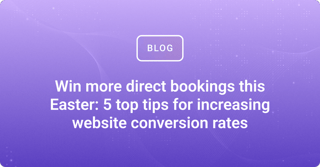When Google announced that the inevitable 'cookie apocalypse' would be postponed, again, until 2025, many marketers sighed with relief that they would have an extra year to start or fine-tune an alternative strategy.
That alternative is first-party data. This type of data is gold for marketers. Firstly, its customer data collected directly by your company through its own channel and sources, avoiding complications caused by data governance rules. Secondly, even without third-party data tracking, you can still collect data on how a customer interacts with your website, including browsing habits and content preferences.
This means that - if properly executed - hotels with a sophisticated first-party strategy can continue to provide personalized, seamless and loyalty-building experiences from the moment a customer begins planning a vacation.
But what are the biggest challenges currently faced by hotels when it comes to their first party data strategy?
1. Capturing first-party data is harder than it seems
Capturing first-party data in a world where breaches and unethical use of personal data are widely publicized means people are more hesitant about handing over such information. 80% of consumers are concerned about the use of their personal data with a further 95% believing it is important their data is protected when online.
This was also reflected the Triptease survey. GDPR and “people not wanting to share any data” was a common response when hoteliers were asked about the main challenges they faced when collecting customer data.
But there are workarounds. Salesforce shared that customers are willing to share such information when there is a clear value exchange, with 51% saying they will do it for discounts, 33% for better content and 14% for relevant ads.
The solution
One easy solution is to collect email addresses directly on your website. Triptease has helped hotels collect thousands of GDPR-compliant emails through the highly popular Email Capture Message.
Across a four month period, EOS Hospitality Hotels collected over 3k customer emails, generating more than $200k in revenue
Combine the message with an enticing value exchange (like an immediate discount, free drink or promise of future special offers) and you can begin to see improvements in your first-party data collection rate.

2. The data collected isn't high quality enough to provide truly personalized experiences
When asked what customer data do they currently collect, almost all Triptease survey respondents said they already collect contact information (first name, last name, email address, physical address or mobile number). Despite this, only half of respondents collect data on their guests' preferences and interests.
The majority of respondents said they use customer data for personalizing email campaigns. But how optimized can an email marketing campaign really be if you only have access to the basic, generic information about your customers?
And the stats make it clear. Your customers want personalized communication. 91% of consumers say they are more willing to do business with a company that provides offers directly relevant to them. 74% of customers become frustrated when their email communication isn't personalized.
The solution
Understanding your prospective guests can be hard when you have little access to vital pre-booking audience insights and data. In order for you to build a hyper-targeted email strategy, you need a tool that can automatically segment email lists with additional customer information like their party size, the lead-time of their search or their potential check-in date.
Triptease Audience Sharing functionality provides hotels with exactly this kind of high-quality, segmented first-party customer data. With this, you can send targeted, personalized email content to specific types of customers e.g. families, last-minute bookers or people looking to stay on a specific date like Valentine's Day.
%20(1).jpg?width=700&height=632&name=img_iphone@2x%20(5)%20(1).jpg)
3. Connecting data from siloed platforms and systems is a manual, time-consuming process
Efficient, effective marketing becomes much more of a challenge when all your time is spent on data maintenance and manually syncing information between different systems. When asked about the major challenges around customer data collection, hoteliers shared answers like “time is taken to manually input data”, “cost, time, skills” and not having “enough staff to manage this”.
It’s tough. Hoteliers are short-staffed and limited on resources which means more time is being spent on low-value data work instead of focusing on more impactful tasks.
The solution
Triptease customer research highlighted the fact that many hoteliers felt they were spending too much time manually downloading and re-uploading email lists into their CRM. While capturing first-party data is of vital importance for hotels, if you don't have a system in place where you can automatically sync that data, you will waste countless hours on unrewarding work.
However, it’s not all doom and gloom. Triptease currently integrates with Salesforce, Mailchimp and Revinate (with more to come) which means customer email data can be sent straight to your CRM, automatically. Allowing you to focus on what you do best, delivering great customer experiences.

Need help with your first-party data strategy?
If you’d like to know more about what the Triptease Data Marketing Platform could do for your hotel’s first-party data and digital marketing strategy, fill out the form below and a member of our team will be in touch.
Megan is the Product Marketing Executive for Targeted Messages.


![[WATCH] What’s new in 2022? Hotel Rate Parity Trends](https://www.triptease.com/hs-fs/hubfs/Resources%20-%20feature%20images/Feature-Image_%5B%5BWATCH%5D%20What%E2%80%99s%20new%20in%202022_%20Hotel%20Rate%20Parity%20Trends%5D.png?width=320&height=320&name=Feature-Image_%5B%5BWATCH%5D%20What%E2%80%99s%20new%20in%202022_%20Hotel%20Rate%20Parity%20Trends%5D.png)





